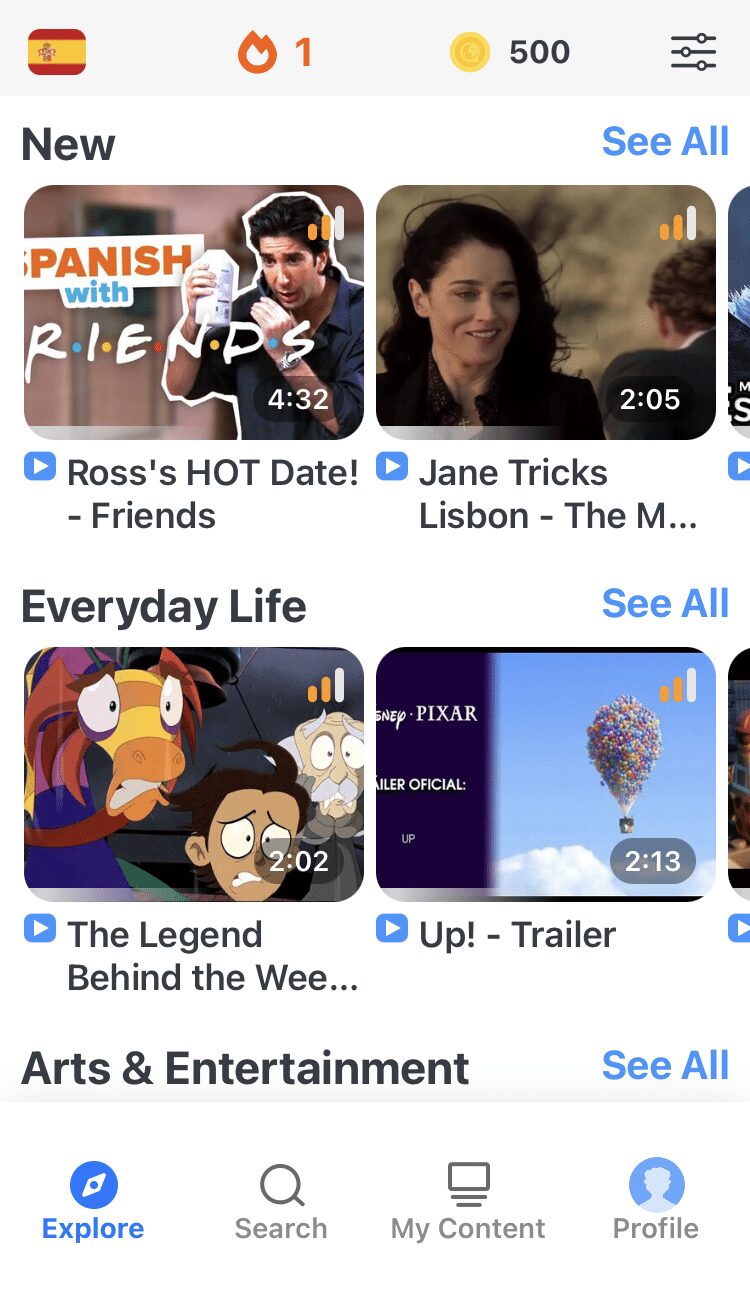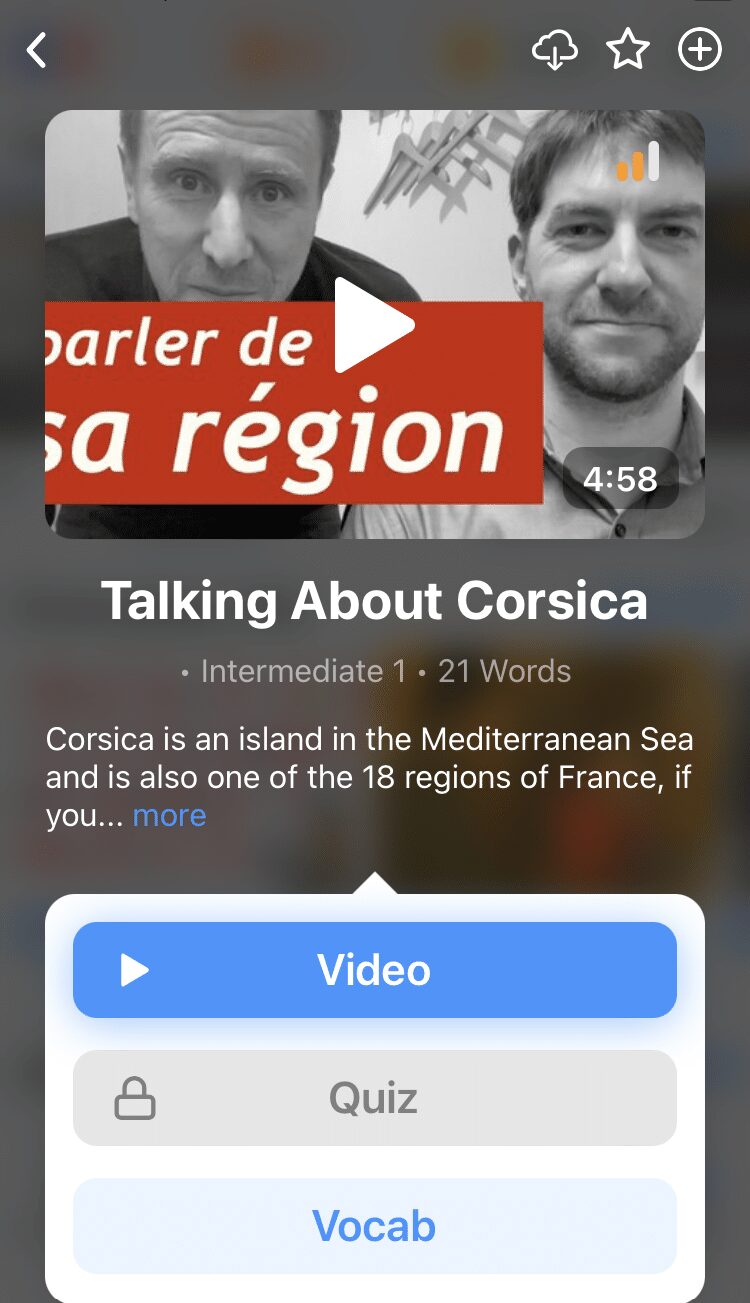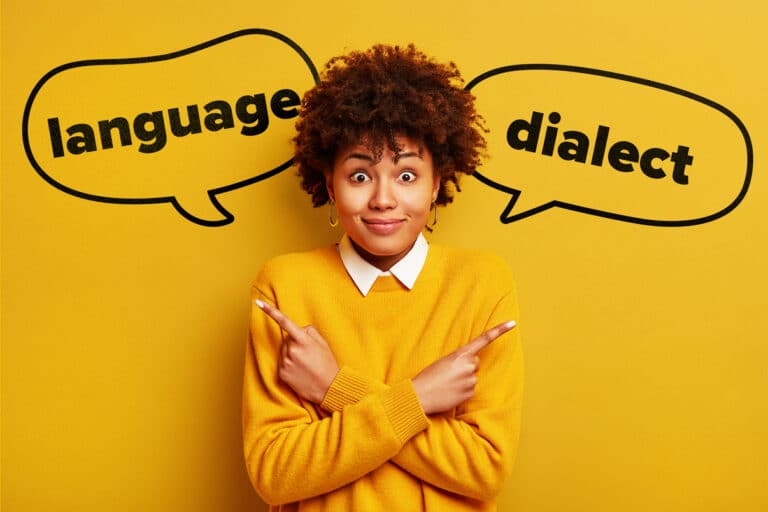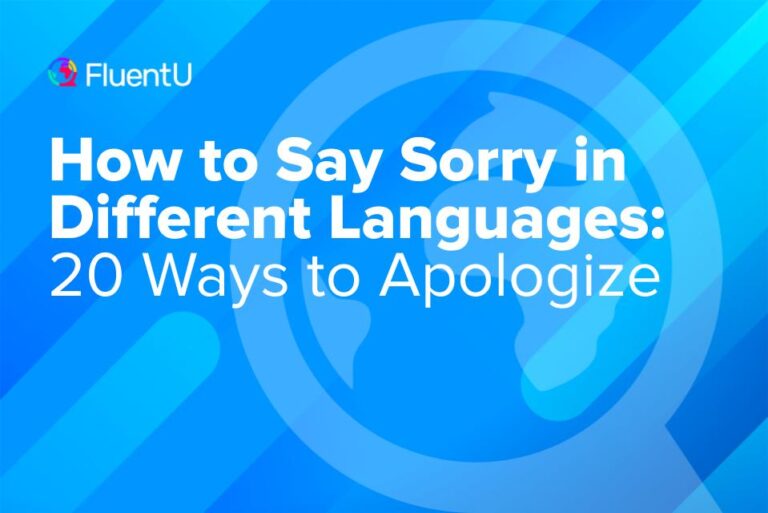Contents
- 1. Hello
- 2. How are you?
- 3. I’m doing well
- 4. My name is…
- 5. What’s your name?
- 6. It’s nice to meet you
- 7. I’m from…
- 8. Where are you from?
- 9. What time is it?
- 10. Where is…?
- 11. How do I get to…?
- 12. Left, Right, Straight
- 13. I’m lost
- 14. Pardon me
- 15. Sorry, I don’t understand
- 16. Can you speak more slowly please?
- 17. I would like…
- 18. I’m allergic to…
- 19. Thank you
- 20. Goodbye
- Why You Should Learn Phrases in Different Languages
- And One More Thing...
Common Conversational Phrases in 5 Languages
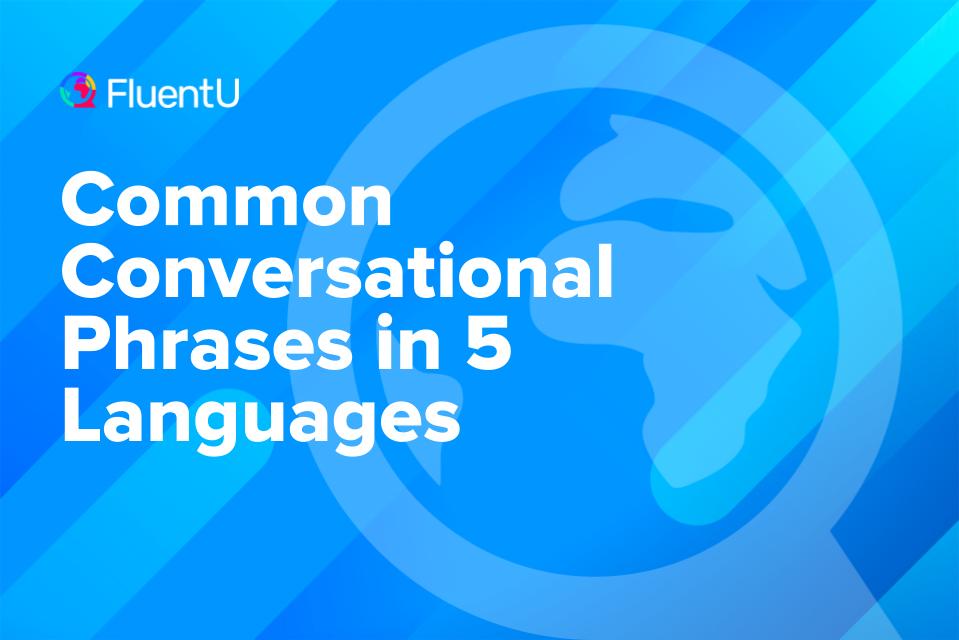
It can be very overwhelming to start a new language, but knowing some of basic phrases makes all the difference in the world.
In this post you’ll learn 20 fundamental conversational phrases in five languages to help you break the ice and navigate common daily situations—from friendly greetings and practical questions to polite expressions. Let’s set your foundation for making connections no matter where your travels take you.
Download: This blog post is available as a convenient and portable PDF that you can take anywhere. Click here to get a copy. (Download)
1. Hello
It’s always nice to greet people when meeting for the first time. An easy “hello” is the simplest way to get it done.
| Spanish | Hola |
| French | Salut |
| Portuguese | Olá |
| German | Hallo |
| Mandarin | 你好 (nǐ hǎo) |
2. How are you?
You don’t have to save this for friends and acquaintances. Even strangers appreciate when someone asks them about their well-being. You may not want to just approach someone in the street with this question, but maybe use it when you’re at a restaurant, grocery store or even the bank.
| Spanish | ¿Cómo está? (formal) / ¿Cómo estás? (informal) |
| French | Comment allez-vous ? (formal) / Comment ça va ? (informal) |
| Portuguese | Como você está? |
| German | Wie geht es dir? |
| Mandarin | 你好嗎? (nǐ hǎo ma) |
3. I’m doing well
This is a common response in almost every language. It’s polite and brief, especially when speaking to a stranger. You can elaborate if you’re more familiar with a person.
| Spanish | Estoy bien |
| French | Ça va bien |
| Portuguese | Tudo bem |
| German | Mir geht es gut! |
| Mandarin | 我很好 (wǒ hěn hǎo) |
4. My name is…
This is another common introductory phrase. Basic phrases like these are short and simple and can help you get used to how words and letters are supposed to sound without stumbling over your speech too much.
| Spanish | Me llamo... / Mi nombre es... |
| French | Je m'appelle... |
| Portuguese | O meu nome é... |
| German | Mein Name ist... |
| Mandarin | 我的名字是... (wǒ de míng zì shì) |
5. What’s your name?
If you’re sharing your name then, of course, the cordial thing to do would be to ask a person theirs. Again, it’s a great way to start small conversations and let people know that you’re making an effort.
| Spanish | ¿Cómo se llama usted? (formal) / ¿Cómo te llamas? (informal) |
| French | Comment vous appelez-vous ? (formal) / Comment t'appelles-tu ? (informal) |
| Portuguese | Qual é o seu nome? |
| German | Wie heißen Sie? (formal) / Wie heißt du? (informal) |
| Mandarin | 貴姓呢? (guì xìng ne) |
6. It’s nice to meet you
Many cultures are similar in how they meet and greet. You want to put your best foot forward, so telling someone that it’s nice to meet them will at least show that you’ve got some manners.
| Spanish | Un placer conocerle (formal) / Un placer conocerte (informal) |
| French | Enchanté / Enchantée (masculine/feminine) |
| Portuguese | Prazer em conhecê-lo |
| German | Nett, Sie kennenzulernen (formal) / Nett, dich kennenzulernen (informal) |
| Mandarin | 很高興見到你 (hěn gāo xìng jiàn dào nǐ) |
7. I’m from…
This is a great conversation starter! People are always curious to know about where you’re from.
| Spanish | Yo soy de... |
| French | Je viens de... |
| Portuguese | Eu sou de... |
| German | Ich komme aus... |
| Mandarin | 我來自 (wǒ lái zì…) |
8. Where are you from?
In the same vein, it’s always interesting to hear where others are from. Maybe you’re from the same place, maybe you’ve traveled to their home country, maybe you have friends or family from their town or country. The “where are you from” question almost always sparks a fun and interesting conversation.
| Spanish | ¿De dónde es usted? (formal) / ¿De dónde eres tú? (informal) |
| French | D'où êtes-vous ? (formal) / D'où es-tu ? (informal) |
| Portuguese | De onde você é? |
| German | Wo kommen Sie her? (formal) / Woher kommst du? (informal) |
| Mandarin | 你從哪裡來? (nǐ cóng nǎ lǐ lái) |
9. What time is it?
Practicalities always come into play during travel, and depending on your itinerary, you may be on a schedule. If you find yourself without a watch or phone, this question is handy when you’re racing against the clock.
| Spanish | ¿Qué hora es? |
| French | Quelle heure est-t-il ? |
| Portuguese | Que horas são? |
| German | Wie spät ist es? |
| Mandarin | 幾點了? (jǐ diǎn le) |
10. Where is…?
This phrase is good to know because it’s versatile. You could be talking about a person, place or thing. Where is Mindy? Where is my phone charger? Where is the Taj Mahal?
| Spanish | ¿Dónde está…? |
| French | Où se trouve... ? |
| Portuguese | Onde é...? |
| German | Wo ist…? |
| Mandarin | ...在哪裡? (… zài nǎ lǐ?) |
11. How do I get to…?
This question is very place specific. If you’re trying to get around and you don’t have access to Wi-Fi or GPS, most locals will be able to tell you how to get where you’re going if you just ask.
| Spanish | ¿Cómo llego a...? |
| French | Comment puis-je arriver à... ? |
| Portuguese | Como faço para chegar até...? |
| German | Wie komme ich nach...? |
| Mandarin | 我怎麼去...? (wǒ zěn me qù…) |
12. Left, Right, Straight
If you’re going to ask how to get somewhere then it might help if you understand directions. At least learning the most basic ones will get you where you need to go.
| Spanish | Izquierda , Derecha , Derecho |
| French | Gauche , Droite , Tout droit |
| Portuguese | Esquerda , Direita , Reta |
| German | Links , Rechts , Geradeaus |
| Mandarin | 左 , 右 , 直 (zuǒ, yòu, zhí) |
13. I’m lost
This one is definitely important to know, especially when you’re in an unfamiliar area. Seek out a safe place and let someone know that you’re lost so they can help you get back on track.
| Spanish | Yo estoy perdido / Yo estoy perdida (masculine/feminine) |
| French | Je suis perdu / Je suis perdue (masculine/feminine) |
| Portuguese | Estou perdido / Estou perdida (masculine/feminine) |
| German | Ich habe mich verlaufen |
| Mandarin | 我迷路了 (wǒ mí lù le) |
14. Pardon me
Again, it’s always good to have manners. Whether you’ve had a tiny collision or you’re trying to get through a crowd, it’s good to be able to throw out an “excuse me” or a “pardon me” so that you can avoid a confrontation.
| Spanish | Perdóneme (formal) / Perdóname (informal) |
| French | Excusez-moi (formal) / Excuse-moi (informal) |
| Portuguese | Desculpe |
| German | Verzeihung (more formal) / Entschuldigung (informal) |
| Mandarin | 對不起 (duì bù qǐ) |
15. Sorry, I don’t understand
You can master your basic phrases so well that you sound fluent. When that happens, locals will start speaking to you as if you’re fluent. That’s a good time to let them know that you don’t understand so that they can switch gears.
| Spanish | Lo siento, pero no entiendo |
| French | Pardon, je ne comprends pas |
| Portuguese | Desculpe, eu não entendo |
| German | Verzeihung, ich verstehe Sie nicht (formal) / Entschuldigung, ich verstehe dich nicht (informal) |
| Mandarin | 對不起, 我不明白 (duì bù qǐ, wǒ bù míng bái) |
16. Can you speak more slowly please?
Switching gears usually means going slower. Let the person know that you’re still learning and you need them to slow it down. Most people will be happy to oblige!
| Spanish | ¿Puede hablar más lento, por favor? |
| French | Pouvez-vous parler plus lentement s'il vous plaît ? (formal) / Peux-tu parler plus lentement s'il te plaît ? (informal) |
| Portuguese | Você pode falar mais devagar, por favor? |
| German | Könnten Sie ein bisschen langsamer sprechen, bitte? (formal) / Könntest du ein bisschen langsamer sprechen, bitte? (informal) |
| Mandarin | 你能說得慢一點嗎? (nǐ néng shuō dé màn yī diǎn ma) |
17. I would like…
This one is great for when you’re out at a restaurant or a cafe or really anywhere that you have options. Instead of using a harsh sounding phrase like “I want,” it’s better to take the politer route.
| Spanish | Yo quisiera... |
| French | Je voudrais... |
| Portuguese | Eu gostaria... |
| German | Ich möchte... |
| Mandarin | 我想要... (wǒ xiǎng yào) |
18. I’m allergic to…
Sadly, allergies don’t go away when we’re abroad. Don’t compromise your health. Let a person know if you’re allergic to certain foods or animals. It’s better to be safe than sorry.
| Spanish | Soy alérgico a... / Soy alérgica a... (masculine/feminine) |
| French | Je suis allergique à... |
| Portuguese | Sou alérgico a... / Sou alérgica a... (masculine/feminine) |
| German | Ich bin allergisch gegen... |
| Mandarin | 我對...過敏 (wǒ duì... guò mǐn) |
19. Thank you
If nothing else, a thank you is always the way to go. It’s the most basic form of polite conversation, and really, if it’s the only phrase you know in 100 languages, then you’ve done all right for yourself.
| Spanish | Gracias |
| French | Merci |
| Portuguese | Obrigado / Obrigada (masculine/feminine) |
| German | Danke |
| Mandarin | 谢谢 (xiè xie) |
20. Goodbye
Farewell, friends. Hopefully this list of basic phrases will help you get started on the language learning adventure of your dreams!
| Spanish | Adiós |
| French | Au revoir |
| Portuguese | Tchau |
| German | Auf Wiedersehen (formal) / Tschüss (informal) |
| Mandarin | 再見 (zài jiàn) |
Why You Should Learn Phrases in Different Languages
Besides being useful in everyday interactions, learning these phrases will help you get comfortable speaking in the language. Speaking is usually the biggest hurdle in language learning, especially if you’re in a place where most people know at least some English.
However, if you commit to learning a few common phrases, you’ll have identified yourself as someone who wants to learn. And people appreciate the effort. Sadly, Americans in particular have a reputation for being unwilling to learn new languages, but make the effort and you’ll see that people will be charmed by your attempt to communicate in their language.
To follow up with these phrases, learn how they’re used in context and start moving on to full conversations, you can try learning a language with FluentU.
FluentU takes authentic videos—like music videos, movie trailers, news and inspiring talks—and turns them into personalized language learning lessons.
You can try FluentU for free for 2 weeks. Check out the website or download the iOS app or Android app.
P.S. Click here to take advantage of our current sale! (Expires at the end of this month.)
Now that you’ve learned the most common phrases in five languages, it’s time to start using them!
Good luck!
Download: This blog post is available as a convenient and portable PDF that you can take anywhere. Click here to get a copy. (Download)
And One More Thing...
If you dig the idea of learning on your own time from the comfort of your smart device with real-life authentic language content, you'll love using FluentU.
With FluentU, you'll learn real languages—as they're spoken by native speakers. FluentU has a wide variety of videos as you can see here:
FluentU has interactive captions that let you tap on any word to see an image, definition, audio and useful examples. Now native language content is within reach with interactive transcripts.
Didn't catch something? Go back and listen again. Missed a word? Hover your mouse over the subtitles to instantly view definitions.
You can learn all the vocabulary in any video with FluentU's "learn mode." Swipe left or right to see more examples for the word you’re learning.
And FluentU always keeps track of vocabulary that you’re learning. It gives you extra practice with difficult words—and reminds you when it’s time to review what you’ve learned. You get a truly personalized experience.
Start using the FluentU website on your computer or tablet or, better yet, download the FluentU app from the iTunes or Google Play store. Click here to take advantage of our current sale! (Expires at the end of this month.)


